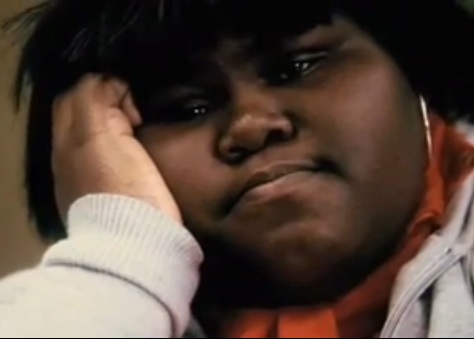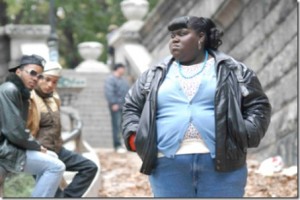Movie Review: Not So “Precious”
By Justin Marble

Gabourey Sidibe plays an overweight and illiterate poor black girl abused by her mother in Precious
“If its Halloween, it must be “‘Saw,’” claims the trailer for the latest iteration of the tired torture-horror franchise surviving more on its audience’s predilection for gooey and gruesome death scenes than coherent storytelling. “Oh yes, there will be blood,” echoes the creepy “Saw” antagonist Jigsaw, a psychotic old man who creates elaborate traps to ensnare those he feels he must teach a lesson.
Or something. Who cares? There’s no point in attacking “torture porn,” the most recent of horror trends that focuses on piling on the most desperate and contrived circumstances possible on its hapless, interchangeable protagonists. There will always be an audience for a voyeuristic bloodbath.
Put me in charge of marketing for Lee Daniels’ “Precious: Based on the novel Push by Sapphire,” and I’d use the “Saw” franchise as my jumping-off point. Because while “Precious” purports to be about serious issues- and Daniels will stuff as many serious issues as possible into this turkey of a film- the parallels to the torture porn genre are one and the same.
The conventional wisdom would say that no film which deals with child abuse, poverty, rape, incest, teen pregnancy, racism, obesity, illiteracy, AIDS, Down’s Syndrome- and I’m probably missing a few other big ticket buzzwords that Daniels has wrapped in his tidy, Oscar-ready package- could possibly be compared to those wholly manipulative and inartistic “Saw” abominations. Could it?
“Precious” centers around Clareece “Precious” Jones (Gabourey Sidibe), an overweight and illiterate poor black girl abused by her mother (Mo’Nique), raped and impregnated twice by her own father (the result of the first incestuous tryst was a down syndrome stricken child deemed “Mongoloid” by Precious) as she tries to escape her horrible home life through an alternative GED program called “Each One Teach One,” headed up by the angelic, light-skinned English Teacher Who Cares™, Ms. Rain (Paula Patton).
The protagonist is also supported by a white social worker (Mariah Carey), a male nurse who helps her deliver her baby (Lenny Kravitz), her comic relief (similarly downtrodden female classmates) and her own fantasies (of her as a rich and famous model, which she slips into as a coping mechanism).
The plot has elements of the done-to-death Hollywood Horatio Alger stories, like “Stand and Deliver” or “Freedom Writers,” but attempts to separate itself through its frank depiction of abuse. Yet Daniels is no better than the “Saw” creators. His aim is to shock, twist, and manipulate, provide a voyeuristic glimpse into this bloody nightmare. Really, his film functions as a way for whites to assuage their own guilt over the atrocities of life in the inner-city.
By going to the film and registering our sympathy, we assure ourselves that we are human. And Daniels knows this, which is why he has Mariah in white makeup, and similarly light-skinned actors coming to the rescue of Precious. It’s just too easy.
Mo’Nique, as the monstrous mother Mary, is his Jigsaw, the motivations for her cruelty just as muddled, farcical, contrived, and unexplained (save for a messy final scene that goes nowhere). Daniels will say and show anything, push any button, to get that gasp that the “Saw” people have already mastered. Whether it’s Mary screaming “I should have had you aborted when I had a chance,” tossing Precious’ baby on the floor, or Daniels inserting a shot of greasy fried chicken during a rape scene, it’s all just a transmutation of torture porn shock tactics. The same way Eli Roth popped someone’s eyeball in “Hostel” and had gobs of green pus ooze out,
“Precious” flies so far over the top that its desperation to be taken seriously is almost laughable.

Precious (Gabourey Sidibe) stolls down the street
It’s a shame, because both Sidibe and Mo’Nique do an admirable job bringing their characters to life. But Mo’Nique especially is betrayed by the script and direction, which prefer to just turn her into a cartoonish bad guy. It takes skill to portray evil and psychosis that deeply. I assume Mo’Nique must have invented her character’s motivations to do so, however, because there certainly aren’t any present in the film.
Alice Miles of “The Times UK” deemed last year’s Oscar winner, “Slumdog Millionaire,” “poverty porn.” Switch out Mumbai for Harlem in 1987, and you’ve got “Precious.” Sure, “Precious” is darker, there is no vague theme of “destiny” or “true love,” and it doesn’t end on a Bollywood dance number. But the fascination with those less fortunate is the same, and don’t think for a second the suits didn’t eye this festival phenomenon with dollar signs in their eyes.
“Precious” has nothing new to say, really. It brings issues up and asks for credit for doing so, but never examines why things are the way they are. Yes, we feel awful for Precious, her child, her circumstances. But there’s never a call to action, never an analysis of what this all means for us as a society, as a human race, how we allow something like this to happen. A work of art like “The Wire “can do in one episode what “Precious” can’t accomplish in two hours. Because beyond just raising these issues, true artists find humanity, find reason. They express something more complex than just acknowledging that problems exist. “Precious” feels phony by comparison, a ghetto Cinderella fairytale.
In “Saw II,” a helpless woman with poison coursing through her veins reaches her hands up through two holes in a glass box toward an antidote. Once her hands are in, the trap triggers, slashing sharp razors along her wrist. We gasp. We scream. We can’t look away. It’s the money shot. Here, Precious slips down the stairs carrying her baby, falling prone at the bottom. Mary the Monster Mother, stomps around the top of the stairs, television in hand. She drops it. We gasp. We scream. We can’t look away. It’s the money shot.
If it’s after Halloween, it must be overstuffed, self-important Oscar-bait masquerading as a tempered study of the human condition. Call it poverty porn, call it torture porn, call it Oscar porn, but it’s porn all the same. It’s still designed to get a very specific reaction. There are films and directors out there that treat the audience with much more respect and intelligence, that allow them to react how they will rather than feeling like they must respond to each and every poke and prod.
Then again, a film like “Precious” and the reaction to it say much more about today’s audiences than it does about any kind of social malady. Daniels prefers to take important issues, put them in a blender, and hit the button, creating a puree mishmash that goes down feeling forced. Still, audiences accept it year after year. Why? Oh yes, there will be blood.


This is one of the most brilliant reviews I’ve ever read; the prose absolutely delicious; and which has me wondering if a novel, or novel-in-the-works, exists by Justin Marble. Rather than appreciate his review simply as a movie review, I found myself caught up in the sheer skill (for language, for sentence-building, for conveyance of meaning), of Mr. Marble as a writer. I’ve got to research his work. Wow.
Fine, fine r’viewin’, old bean. I actually found myself laughing at “Precious” with self-mocking contempt for most of proceedings, never more so than in the scene in which Martin Lawrence, as Big Momma, tries to drop the television in slow-motion on the head of her daughter/granddaughter, whilst the “soulful” gospel music wails and the snapshots of Big Momma and baby from years ago pop up like it’s an episode of “This Is Your Life.”
It’s an embarrassingly bad moment in a cringe worthy film; can’t wait to see this film inevitably triumph on that ultimate celebration of shitty film making: Oscar night.
I agree with your review that this was a movie with not much point except to shock. More than that, I am disturbed at the implication that the daughter’s Down’s Syndrome is caused by incest, drugs, or related to HIV. I don’t know if this part of the story was based on truth from a real story or added for the “shock factor,” but the risk of this condition in a young woman almost non-existent. Now many people will likely believe what the movie implies because what’s on TV is always true, right? Isn’t the point of the movie to expose discrimination and stigmatization? Ironic.